|
|
|
Sort Order |
|
|
|
Items / Page
|
|
|
|
|
|
|
| Srl | Item |
| 1 |
ID:
172143
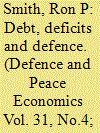

|
|
|
|
|
| Summary/Abstract |
Military spending associated with wars has been a major cause of government deficits and debt financing. This paper looks at the association between debt and defence spending in the UK over the last three centuries. The paper reviews the history, discusses the theory and provides some estimates of the effect of variations in military expenditure on debt. The association tends to be quite close and the effect of the change in the share of military spending in GDP on the debt–GDP ratio is quite stable.
|
|
|
|
|
|
|
|
|
|
|
|
|
|
|
|
| 2 |
ID:
060255
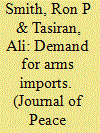

|
|
|
| 3 |
ID:
083242
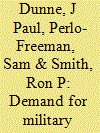

|
|
|
|
|
| Publication |
2008.
|
| Summary/Abstract |
This paper considers the interpretation of the empirical results of the developing literature on the demand for military spending that specifies a general model with arms race and spill-over effects and estimates it on cross-section and panel data. It questions whether it is meaningful to talk of an 'arms race' in panel data or cross-section data, and suggests that it may be more appropriate to talk about the relevant variables - aggregate military spending of the 'Security Web' (i.e. all neighbours and other security-influencing powers) and the aggregate military spending of 'Potential Enemies' - as acting as proxies for threat perceptions, which will reflect both hostility and capability.
|
|
|
|
|
|
|
|
|
|
|
|
|
|
|
|
| 4 |
ID:
128870


|
|
|
|
|
| Publication |
2014.
|
| Summary/Abstract |
There is a large literature on the economic costs of military conflict, which uses a variety of methods including accounting procedures, statistical models and event studies of how stock markets respond to news of conflict. This literature is not only subject to all the criticisms directed against cost-benefit analysis but also introduces an element of arbitrariness by not considering benefits. This article uses four questions to structure a discussion of the calculation of conflict costs. The first concerns the purpose of the calculation: why is it being done? The second concerns the counterfactual: what comparison is being made? The third concerns the data: where do the numbers come from? The fourth concerns aggregation and valuation: how are the elements of costs (over outcomes, time and individuals) combined? The literature is often not clear on the answers to these questions, tending to take them for granted. However, the answers are crucial to the calculation and are not merely technical matters but rest on both the underlying objective of the calculation and fundamental philosophical and ethical judgements.
|
|
|
|
|
|
|
|
|
|
|
|
|
|
|
|
| 5 |
ID:
048416
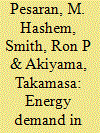

|
|
|
|
|
| Publication |
Oxford, Oxford University Press, 1999.
|
| Description |
xxiii, 226p.
|
| Standard Number |
0197300200
|
|
|
|
|
|
|
|
|
|
|
|
Copies: C:1/I:0,R:0,Q:0
Circulation
| Accession# | Call# | Current Location | Status | Policy | Location |
| 041412 | 333.79095/PES 041412 | Main | On Shelf | General | |
|
|
|
|
| 6 |
ID:
153087


|
|
|
|
|
| Summary/Abstract |
Strategic interactions between countries, such as arms races, alliances and wider economic and political shocks, can induce strong cross-sectional dependence in panel data models of military expenditure. If the assumption of cross-sectional independence fails, standard panel estimators such as fixed or random effects can lead to misleading inference. This paper shows how to improve estimation of dynamic, heterogenous, panel models of the demand for military expenditure allowing for cross-sectional dependence in errors using two approaches: Principal Components and Common Correlated Effect estimators. Our results show that it is crucial to allow for cross-sectional dependence, that the bulk of the effect is regional and there are large gains in fit by allowing for both dynamics and between country heterogeneity in models of the demand for military expenditures.
|
|
|
|
|
|
|
|
|
|
|
|
|
|
|
|
| 7 |
ID:
100955
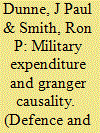

|
|
|
|
|
| Publication |
2010.
|
| Summary/Abstract |
A large literature has used tests for Granger (1969) non-causality, GNC, to examine the interaction of military spending with the economy. Such tests answer a specific although quite limited question: can one reject the null hypothesis that one variable does not help predict another? If one can reject, there is said to be Granger causality, GC. Although the limitations of GNC tests are well known, they are often not emphasised in the applied literature and so may be forgotten. This paper considers the econometric and methodological issues involved and illustrates them with data for the US and other countries. There are three main issues. First, the tests may not be informative about the substantive issue, the interaction of military expenditure and the economy, since Granger causality does not correspond to the usual notion of economic causality. To determine the relationship of the two notions of causality requires an identified structural model. Second, the tests are very sensitive to specification. GNC testing is usually done in the context of a vector autoregression, VAR, and the test results are sensitive to the variables and deterministic terms included in the VAR, lag length, sample or observation window used, treatment of integration and cointegration and level of significance. Statistical criteria may not be very informative about these choices. Third, since the parameters are not structural, the test results may not be stable over different time periods or different countries.
|
|
|
|
|
|
|
|
|
|
|
|
|
|
|
|
| 8 |
ID:
153085
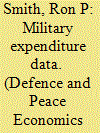

|
|
|
|
|
| Summary/Abstract |
This paper discusses some of the methodological issues involved in analysing military expenditure data, with particular reference to the extended SIPRI data-set. The discussion is organised under the headings of validity, what is the appropriate concept to measure? reliability, how well is it being measured? and comparability, is the same thing being measured over time and space? The paper then considers some of the econometric issues involved in the use of such data.
|
|
|
|
|
|
|
|
|
|
|
|
|
|
|
|
| 9 |
ID:
174610
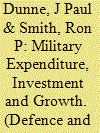

|
|
|
|
|
| Summary/Abstract |
This paper considers the issues involved in estimating the effect of military expenditure on growth and the reasons for the lack of consensus in the literature. It briefly reviews the economic theory, emphasising the difficult identification issues involved in determining the interaction between military expenditure and output and discusses econometric methods for panels. It then takes advantage of the extended SIPRI military spending to construct a relatively large balanced panel of countries for the period 1960–2014. Rather than the usual focus on the direct relation between military spending on growth, it focusses upon the investment channel. It provides estimates of various models examining the interaction between the three variables and finds that the data do not suggest any strong relations between military expenditure and either investment or growth. This is not unexpected given the theoretical and econometric problems identified.
|
|
|
|
|
|
|
|
|
|
|
|
|
|
|
|
| 10 |
ID:
069855
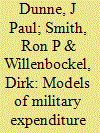

|
|
|
|
|
|
|
|